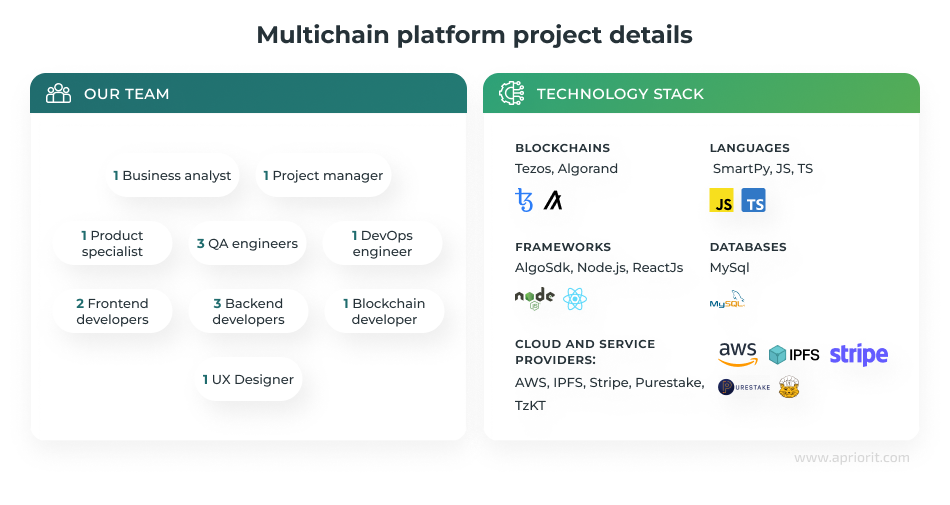A carbon offsetting company aimed to create a blockchain-powered platform to tokenize and trade carbon offset certificates. Their vision was to provide an accessible solution for individuals and businesses to transparently offset their carbon emissions.
To bring this vision to life, we developed a multichain solution featuring two interconnected platforms: one tailored for retail customers (B2C) and another for businesses (B2B). We leveraged the Tezos and Algorand blockchains to enable secure, decentralized transactions and introduced a user-friendly interface for engaging with the platforms.
Our client
Our client is a company providing carbon offsetting services. Their goal is to tokenize carbon certificates and sell them as blockchain carbon credits to individual and business customers, promoting transparency and sustainability.
The challenge
The client asked us to build a blockchain-based platform capable of managing semi-fungible tokens (SFTs) representing carbon offset certificates. The initial requirements included using the Algorand blockchain for tokenization and a web interface for interacting with tokens. However, the project faced several challenges:
- Technical limitations. The Algorand blockchain’s smart contract language didn’t allow for implementing the required token behavior, including complex interactions and specific conditions (such as managing the relationships between different types of tokens and certificates).
- User accessibility. The client’s end users were largely unfamiliar with blockchain technology, so we needed to integrate a convenient payment option to ease their experience.
- Performance constraints. Decentralized storage solutions such as InterPlanetary File System (IPFS) resulted in slow data access, harming the user experience.
- Certificate verification. Platform users had to be sure that certificates for carbon credits on the blockchain were authentic, so we needed to set up a reliable verification mechanism and ensure users could access verification information on the blockchain and in certificates.
The result
The delivered solution included two interconnected blockchain platforms tailored to separate client groups:
- B2B platform on Tezos — facilitated the sale of complete carbon offset certificates to business customers and handled the complex logic of token trading for both platforms.
- B2C platform on Algorand — divided complete certificates into fractions (e.g., portions of one metric ton of CO2) and allowed B2C customers to purchase these fractional offsets.
- Web interface — allowed access to blockchain platforms for end users and provided seamless fiat payments for non-blockchain users.
These platforms enabled the client to tokenize carbon offset certificates and offer a seamless experience across decentralized networks.
Our approach
To develop a platform that met the client’s unique needs, we first conducted a detailed analysis of the client’s business goals and technical requirements. Initially, the client planned to exclusively use the Algorand blockchain, but we identified technical limitations in Algorand’s smart contract functionality. After several rounds of discussion, we proposed a hybrid approach that combined the Tezos and Algorand blockchains.
This allowed us to:
- Implement the required features while maintaining a decentralized structure for token logic
- Design a multichain platform to cater to two distinct use cases: a B2C platform for fractional certificate trading and a B2B platform for complete certificate sales
- Ensure seamless integration between the platforms through a common backend service
- Provide a fiat payment option to improve accessibility for non-blockchain users
- Support our client’s focus on the principles of sustainability, as Tezos is an energy-efficient, “green” blockchain just like Algorand
Once the client approved our plan, we formed a dedicated team, selected a suitable technology stack, and started development.

Looking for an expert blockchain development partner?
Bring your vision to life with a reliable team of blockchain developers and outpace your competition with a smart and innovative blockchain solution!
How we did it
To build a multichain blockchain solution, we followed a structured approach that included defining requirements, developing a hybrid architecture, implementing core functionalities, and ensuring seamless integration between the Tezos and Algorand platforms.

Step 1. Discuss requirements and architecture
We worked closely with the client to define the project scope and evaluate the feasibility of the initial requirements. Due to limitations in Algorand’s programming capabilities, we proposed building the MVP version on Tezos and adding Algorand later. This way, the solution would have tradable semi-fungible tokens with custom on-chain logic.
Step 2. Implement the MVP
First, we focused on developing core logic on the Tezos blockchain and implementing the following functionality:
- Tokenization of carbon offset certificates into semi-fungible tokens
- Web UI for interacting with tokens
- Decentralized storage of all data on Tezos and IPFS
This MVP provided a live example for the client to validate their business idea and refine the solution.
Step 3. Implement the Algorand blockchain
Building on the MVP, we introduced a dual-platform architecture with separate interfaces for B2B and B2C audiences. To accommodate the client’s preference for Algorand, we expanded the solution to integrate both blockchains. At this stage, our team:
- Connected the Tezos and Algorand platforms via a shared backend service to ensure seamless operation
- Addressed performance bottlenecks in IPFS by introducing a caching layer on the back end and optimizing data structures
- Integrated Stripe payments, managed through the back end, to accommodate non-crypto users
- Set up an automated deployment pipeline and a secure environment
As a result, the Algorand platform allowed retail customers to purchase fractional certificate shares, while the Tezos platform facilitated complete certificate sales for businesses.
Related project
Decentralized Blockchain Application for International Remittance Payments
Explore how the Apriorit team designed and delivered a high-quality DApp to drive flexibility and cost-efficiency of our client’s solution.
Step 4. Test and deploy to the mainnet
Before launching the platform on the mainnet, we conducted thorough security testing and a third-party audit to ensure the solution was robust and secure. After addressing minor findings, we deployed the platform, allowing users to effectively tokenize and trade carbon offset certificates.
Step 5. Make ongoing improvements
Following the release, we initiated discussions with the client to identify additional functionality that could enhance the platform’s capabilities and user experience. We are currently working on enabling users to sell carbon credit certificates to the platform to expand its capabilities and impact.
The impact
The client now has a working platform that leverages the strengths of both the Tezos and Algorand blockchains to tokenize carbon offset certificates and offer them to a diverse audience.
The B2C platform allows retail customers to purchase fractional shares of carbon offset certificates, while the B2B platform supports the sale of entire certificates to businesses. These solutions promote transparency and accessibility in carbon offsetting.
We are currently working on adding new functionality to further enhance the platform’s capabilities, expand its user base, and support the client’s mission of combating climate change through innovative technology.
Planning to launch a blockchain solution?
Reach your business goals and conquer your target market with a secure blockchain solution by Apriorit engineers!




